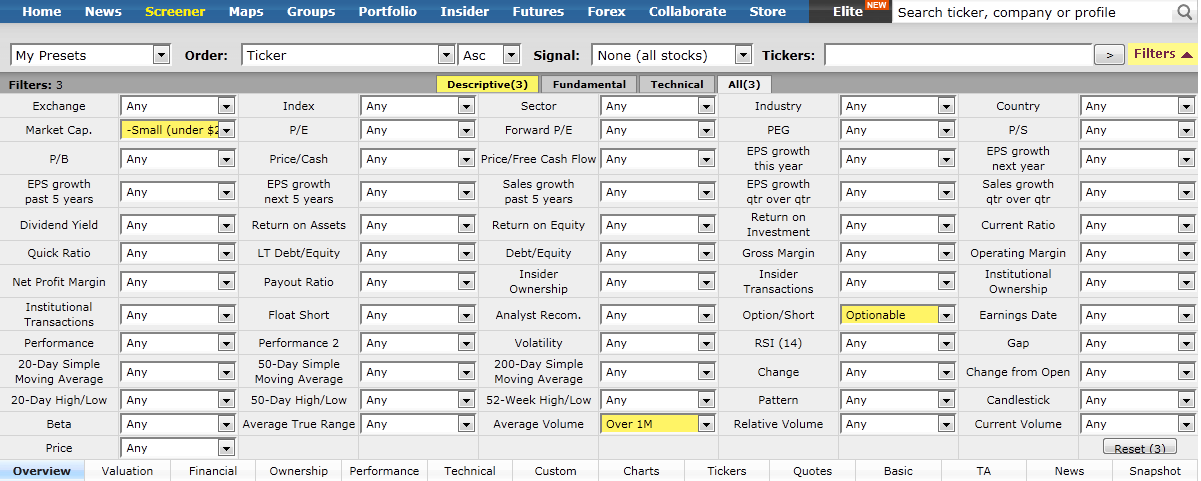I rarely, if ever, discuss options in the Small
Cap Investor Daily.
However, the number of questions from readers has
recently picked up regarding this fast growing investment approach. And I
have research analyst Andy Crowder on our team - he has over a decade of
experience trading options and publishing his strategies for a select
group of subscribers.
So I've decided to set some time aside to discuss
options and how to use them appropriately with small cap stocks.
Hopefully this will help you begin to understand that options offer
endless possibilities to increase your returns in an up, down or
range-bound market.
***The easiest way to search for companies that
have optionable stocks is to screen for them using a stock screener like
FinViz.com.
This is extremely easy and only requires 4 simple steps.
-
Click on the 'All' tab
-
Set Market Cap to "Small (under $2 billion)
-
Set Average Volume to "Over $1M"
-
Set Option/Short to "Optionable"
Once you complete the aforementioned steps you
should come up with roughly 313 companies that meet our
requirements.
This first screen is a necessary part of the
process when trading options on small cap stocks. That's because most
small cap stocks are not optionable, meaning options are not available on
the stock. If the stock is optionable it may still lack the volume
necessary to make a sound and reasonable option investment.
Most importantly, this screen will save you lots
and lots of time.
I suggest saving this screen for future reference
so you can go back and check your list to see if your next small cap
stock of choice is optionable. Thank me later, as this is a true time
saver.
***The most important search criteria for finding
what I call 'tradeable' options on small cap stocks -
VOLUME. The reason I chose to search for small cap
stocks with an average volume over 1 million shares traded is because I
want liquid options. Liquidity directly translates into a reasonable
bid/ask spread for options - this is
critical.
The more liquid the option the tighter the bid/ask
spread. This is extremely important because the bid/ask spread impacts
the cost of using options. Wide bid/ask spreads eat into the potential
profitability of your investment, and contribute to what is known as
'slippage'.
A real world example of how volume effects the
bid/ask spread should help to clarify.
Let's use The Cheesecake Factory (Nasdaq:
CAKE) and USANA Health Sciences USNA
for our exampIe. I chose these two companies because they are both small
cap stocks with share prices of roughly $30 a share. I want to choose two
stocks with equal properties, other than volume. The impact of volume
will be blatantly obvious on the bid/ask spread.
If you look at the June 30 calls for both stocks
you will see the following bid/ask spread:
|
|
Avg. Vol. | Bid Price |
Ask Price |
| The Cheesecake Factory CAKE | 1.07M | $1.35 | $1.45 |
| USANA Health Sciences USNA | 97.9K | $1.70 | $2.20 |
Notice the difference?
The bid/ask spread is $.10 on CAKE compared to an
enormous $0.50 on USNA.
This is the reason why a tight bid/ask spread is
so critical when using options as part of your investment strategy. You
can rarely buy an options contract at anything other than the ask price,
and you can rarely sell one at anything other than the bid, especially if
the options are illiquid. It is you versus the market maker and believe
me you will never win that battle. With a wide bid/ask spread you are
technically underwater 10 to 30 percent or more, right from the get go.
Nobody wants to make up 30 percent just to breakeven.
In conclusion, dealing with the bid/ask spread is
an inevitable part of the options arena. Focus on more liquid and
actively traded contracts that have smaller bid/ask spreads, rather than
stocks with little to no volume and wide spreads. This is an important
lesson to learn when using options as part of your investment strategy.
You will save yourself many headaches and most importantly, hard-earned
money.
As stated earlier, I will be back in the coming weeks with more to discuss on the wonderful world of options.
© 2024 Benzinga.com. Benzinga does not provide investment advice. All rights reserved.
Comments
Trade confidently with insights and alerts from analyst ratings, free reports and breaking news that affects the stocks you care about.
